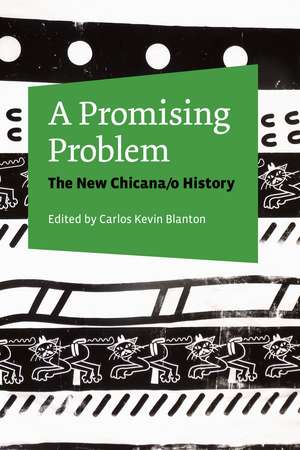A Promising Problem: The New Chicana/o History
Editat de Carlos Kevin Blantonen Limba Engleză Paperback – 8 mar 2016
Showcasing a variety of new directions, this anthology spans topics such as growth and reassessment in Chicana/o history manifested in a disruption of nationalism and geographic essentialism, the impact of legal history, interracial relations and the experiences of Latino subpopulations in the US South, race and the politics of religious history, transborder feminism in the early twentieth century, and aspirations for a field that increasingly demonstrates the relational dynamics of cultural production. As they reflect on the state of their field, the contributors offer significant insights into sociology, psychology, anthropology, political science, education, and literature, while tracing the history of activism throughout the last century and debating the very concepts of “Chicano” and “Chicano history.” Although the political landscape is fraught with closed-off rhetoric, A Promising Problem encourages diversity of thought and opens the possibilities of historical imagination.
Preț: 250.26 lei
Nou
Puncte Express: 375
Preț estimativ în valută:
47.89€ • 52.00$ • 40.23£
47.89€ • 52.00$ • 40.23£
Carte indisponibilă temporar
Doresc să fiu notificat când acest titlu va fi disponibil:
Se trimite...
Preluare comenzi: 021 569.72.76
Specificații
ISBN-13: 9781477309032
ISBN-10: 1477309039
Pagini: 224
Ilustrații: 1 b&w map
Dimensiuni: 152 x 229 x 18 mm
Greutate: 0.34 kg
Editura: University of Texas Press
Colecția University of Texas Press
ISBN-10: 1477309039
Pagini: 224
Ilustrații: 1 b&w map
Dimensiuni: 152 x 229 x 18 mm
Greutate: 0.34 kg
Editura: University of Texas Press
Colecția University of Texas Press
Notă biografică
CARLOS KEVIN BLANTON is an associate professor of history at Texas A&M University.
Cuprins
- Preface
- Acknowledgments
- Chapter One. Looking In while Stepping Out: Growth, Reassessment, and the Promising Problem of the New Chicana/o History (Carlos Kevin Blanton)
- Chapter Two. The Accidental Historian; or, How I Found My Groove in Legal History (Michael A. Olivas)
- Chapter Three. Moving beyond Aztlán: Disrupting Nationalism and Geographic Essentialism in Chicano/a History (Lilia Fernández)
- Chapter Four. Chicana/o History as Southern History: Race, Place, and the US South (Perla M. Guerrero)
- Chapter Five. Sacred Spaces: Race, Resistance, and the Politics of Chicana/o and Latina/o Religious History (Felipe Hinojosa)
- Chapter Six. Chicanas in the US-Mexican Borderlands: Transborder Conversations of Feminism and Anarchism, 1905–1938 (Sonia Hernández)
- Chapter Seven. Eastside Imaginaries: Toward a Relational and Transnational Chicana/o Cultural History (Luis Alvarez)
- Select Bibliography of Recent Publications in Chicana/o History
- Contributors
- Index
Recenzii
"[A Promising Problem's] essays offer fresh insights that make this edited collection a worthwhile read."
"What is fresh about these essays is their insistence that a multitude of actors, both within and outside of Latina/o communities, has shaped Chicana/o history and identity...A Promising Problem both highlights new work and raises...important questions for continued debate."
"The essays assembled [in A Promising Problem] represent a variety of topics and subfields, though Blanton is careful to note that the volume is far from exhaustive or representative of all Chicana/o history. Nonetheless, the collection captures well the field's 'promising problem.'"
"While the essays [in A Promising Problem] represent the broad spectrum of Mexican American history, all authors speak to each other by referencing each other's work and pointing out common findings across chapters. This technique makes for a much more integrated and tightly-woven anthology than is common among such books, indicating that much thought went into crafting the study."
Descriere
In this collection of innovative, thought-provoking essays, established and emerging scholars consider the sea changes taking place within Chicana/o scholarship, the shifting racial and political boundaries of Chicana/o communities, and new perspectives o
